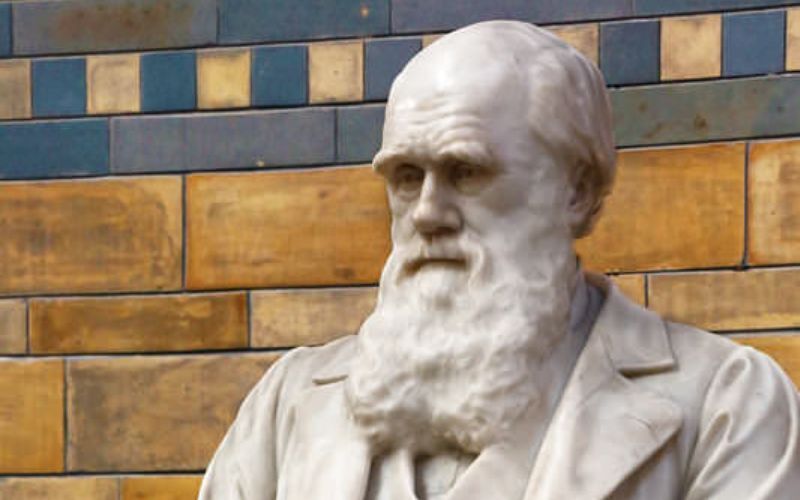Photo by Tinamou on Dreamstime - Statue Of Charles Darwin
by Dr. Chris Kukk
Everyone’s heard the saying that “nice guys finish last” but reality and evolutionary science show that compassionate people finish on top…together. From Charles Darwin’s The Descent of Man written 140 years ago to current neuroscience research showing that our brain’s structure is hardwired to be kind, generous and social rather than mean, selfish and asocial, the evidentiary support for compassion as the strongest instinct for evolutionary success in both the animal and business worlds as well as for creating vibrant academic and civic communities is wide and deep. Any doubt or skepticism for the idea does not come from science but from our popular culture; we commercialize “survival of the fittest” when science and reality show that it is really “survival of the kindest” that leads to more durable success.
We popularize, propagate and celebrate independent achievement above all other values and the cost of such exclusiveness has been hinted upon in newspaper headlines and academic studies over the last five years. “Almost 80 percent of [middle and high school] students,” according to a 2014 study by Harvard’s Graduate School of Education, “ranked achievement or happiness over caring for others.” The authors of the report highlight a “rhetoric/reality gap”—a mismatch between what parents and teachers say is important and what our children and students see us do—as the “root” cause of the student rankings. Another study from 2009 in a journal of business and economics reached the following conclusion after surveying the values of business students: “This evidence suggests that business school curricula that focus on acting ethically because it is the right thing to do may be ineffective. Our results indicate it may be important to openly discuss ethical behavior in a cost-benefit framework with the costs and benefits clearly defined.” The authors’ conclusion offers clear insight into the ideological undercurrent of the 2008 economic tsunami that swept over all of us.
The headlines show why we need to strive to be more than just achievers and why we need to weave compassion into learning environments at all levels of education. “Any healthy civil society,” as the Harvard Graduate School of Education report states, “also depends on adults who are committed to their communities and who, at pivotal times, will put the common good before their own. We don’t seem to be preparing large numbers of youth to create this society.” Do we really want a society of self-centered and self-absorbed achievers who answer ethical questions on a broad range of issues from a personal cost-benefit analysis? The idea that there has to be a choice between achievement and caring for others is a false dilemma. There is a better model for success that strengthens society as it strengthens the individual. We can prepare our children, students and employees to be compassionate achievers.
A compassionate achiever is someone who can apply their knowledge and skills to problems and opportunities in ways that strengthen themselves as well as others. A compassionate achiever is really a successful learner who thinks beyond him- or her-self; for learning is the process of acquiring knowledge and skills so that they can be applied with efficiency and effectiveness to problems and opportunities. The issue with education is that it has become a process of gathering and knowing facts to be recalled…period. While gathering and knowing facts is important, we should not be treating it as the ‘landing zone’ of education (via standardized tests). Rather, knowing facts should be the ‘launching pad’ for learning.
The ‘launching pad’ for learning perspective is used to achieve success in everything from business to sports. Knowing the fundamentals in sports, for example, is important but learning how to apply them on the court/field is ‘everything’ when it comes to success. Although a basketball team might have three of the best players in basketball, it doesn’t mean that they will “win it all.” While the 2013 Miami Heat arguably had three of the best basketball players on their roster, the San Antonio Spurs beat them in the 2014 National Basketball Association’s Championship because the Spurs were better at applying the fundamentals as a team rather than simply as individuals. The Spurs had a better understanding and sense about where and what each of their teammates would be and do in a given situation than the Heat. The soccer legend Pele has been saying for decades that such an understanding is the key to success. Success is not a solo/asocial endeavor but a connected/social experience (neuroscience has shown that this is also how the brain successfully learns). Alexander Graham Bell, known for his inventive genius and deep compassion, knew this when he said “Great discoveries and improvements invariably involve the cooperation of many minds.” Compassionate achievers not only learn this early and continually but they live it daily and consciously and that is why they finish on top... together.

